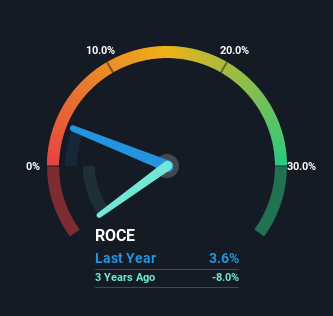- Singapore
- /
- Trade Distributors
- /
- SGX:BDU
Federal International (2000) (SGX:BDU) Is Experiencing Growth In Returns On Capital

If we want to find a potential multi-bagger, often there are underlying trends that can provide clues. Amongst other things, we'll want to see two things; firstly, a growing return on capital employed (ROCE) and secondly, an expansion in the company's amount of capital employed. If you see this, it typically means it's a company with a great business model and plenty of profitable reinvestment opportunities. So when we looked at Federal International (2000) (SGX:BDU) and its trend of ROCE, we really liked what we saw.
What Is Return On Capital Employed (ROCE)?
Just to clarify if you're unsure, ROCE is a metric for evaluating how much pre-tax income (in percentage terms) a company earns on the capital invested in its business. Analysts use this formula to calculate it for Federal International (2000):
Return on Capital Employed = Earnings Before Interest and Tax (EBIT) ÷ (Total Assets - Current Liabilities)
0.036 = S$2.6m ÷ (S$145m - S$73m) (Based on the trailing twelve months to June 2022).
Thus, Federal International (2000) has an ROCE of 3.6%. Ultimately, that's a low return and it under-performs the Trade Distributors industry average of 7.7%.
See our latest analysis for Federal International (2000)

Historical performance is a great place to start when researching a stock so above you can see the gauge for Federal International (2000)'s ROCE against it's prior returns. If you want to delve into the historical earnings, revenue and cash flow of Federal International (2000), check out these free graphs here.
How Are Returns Trending?
Shareholders will be relieved that Federal International (2000) has broken into profitability. While the business was unprofitable in the past, it's now turned things around and is earning 3.6% on its capital. Interestingly, the capital employed by the business has remained relatively flat, so these higher returns are either from prior investments paying off or increased efficiencies. So while we're happy that the business is more efficient, just keep in mind that could mean that going forward the business is lacking areas to invest internally for growth. So if you're looking for high growth, you'll want to see a business's capital employed also increasing.
Another thing to note, Federal International (2000) has a high ratio of current liabilities to total assets of 50%. This can bring about some risks because the company is basically operating with a rather large reliance on its suppliers or other sorts of short-term creditors. While it's not necessarily a bad thing, it can be beneficial if this ratio is lower.
The Bottom Line On Federal International (2000)'s ROCE
To sum it up, Federal International (2000) is collecting higher returns from the same amount of capital, and that's impressive. Given the stock has declined 69% in the last five years, this could be a good investment if the valuation and other metrics are also appealing. So researching this company further and determining whether or not these trends will continue seems justified.
Federal International (2000) does come with some risks though, we found 5 warning signs in our investment analysis, and 3 of those shouldn't be ignored...
For those who like to invest in solid companies, check out this free list of companies with solid balance sheets and high returns on equity.
If you're looking to trade Federal International (2000), open an account with the lowest-cost platform trusted by professionals, Interactive Brokers.
With clients in over 200 countries and territories, and access to 160 markets, IBKR lets you trade stocks, options, futures, forex, bonds and funds from a single integrated account.
Enjoy no hidden fees, no account minimums, and FX conversion rates as low as 0.03%, far better than what most brokers offer.
Sponsored ContentNew: AI Stock Screener & Alerts
Our new AI Stock Screener scans the market every day to uncover opportunities.
• Dividend Powerhouses (3%+ Yield)
• Undervalued Small Caps with Insider Buying
• High growth Tech and AI Companies
Or build your own from over 50 metrics.
Have feedback on this article? Concerned about the content? Get in touch with us directly. Alternatively, email editorial-team (at) simplywallst.com.
This article by Simply Wall St is general in nature. We provide commentary based on historical data and analyst forecasts only using an unbiased methodology and our articles are not intended to be financial advice. It does not constitute a recommendation to buy or sell any stock, and does not take account of your objectives, or your financial situation. We aim to bring you long-term focused analysis driven by fundamental data. Note that our analysis may not factor in the latest price-sensitive company announcements or qualitative material. Simply Wall St has no position in any stocks mentioned.
About SGX:BDU
Federal International (2000)
An investment holding company, operates as an integrated service provider and procurement specialist in the oil and gas, and energy industries in Indonesia, Japan, the People’s Republic of China, Singapore, Thailand, the United Kingdom, Vietnam, and internationally.
Adequate balance sheet low.
Market Insights
Community Narratives



